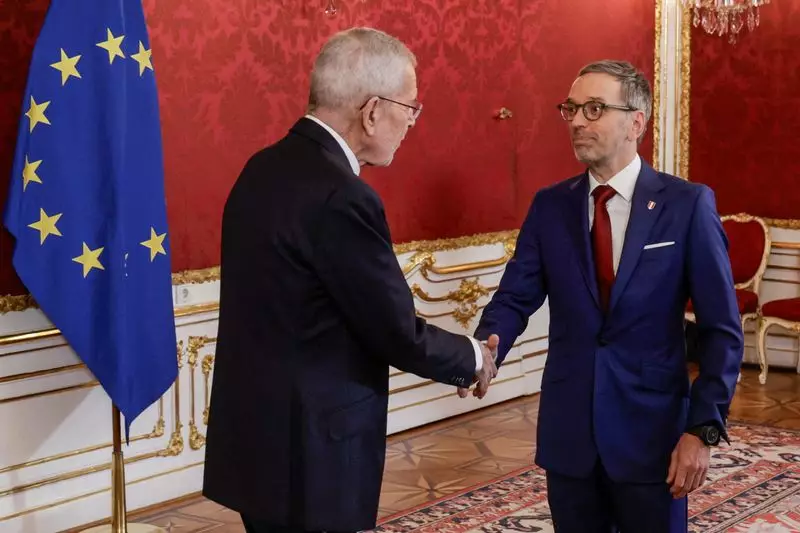In the aftermath of a significant parliamentary election in September, Austria finds itself navigating a challenging political landscape. The far-right Freedom Party (FPO), led by Herbert Kickl, surged to the forefront, garnering over 29% of the vote, marking its first-time positioning as the leading party in the Austrian parliament. This election result has incited substantial discussions surrounding the potential for a coalition government, particularly after attempts by centrist parties to establish a government without the FPO faltered dramatically.
President Alexander Van der Bellen met with Kickl under the looming shadows of a coalition impasse. The centrist conservative People’s Party (OVP), which finished second in the election, encountered difficulties in forming a viable government, leading to the resignation of Chancellor Karl Nehammer. His departure underscored the urgency of the situation—the political landscape having shifted significantly with the rise of the FPO. Historically, the FPO has held power as a junior partner, yet it stands on the brink of potentially leading a government for the first time, a move that would indicate a stark shift in Austria’s political dynamics.
The central challenge of coalition formation now rests with the question of whether the OVP can reconcile its differences with the FPO. Nehammer’s tenure was characterized by an outright rejection of this possibility, branding Kickl as a conspiracy theorist and a potential threat to security. However, with Nehammer’s resignation, that once insurmountable barrier appears to be crumbling. Christian Stocker, the interim leader of the OVP, expressed a willingness to engage in coalition talks with the FPO, recognizing an avenue that had previously been closed.
“What we’re witnessing is a seismic shift,” remarked Wilfried Haslauer, a prominent figure within the OVP, who hinted at the openness to collaboration with the FPO. This pivot in the OVP’s stance signifies a broader recalibration in the political ethos of Austria, especially as the FPO’s support appears to be on the rise following the elections—a clear indication that public sentiment is aligning more favorably with their agenda.
Both the OVP and the FPO share common ground on several contentious issues, primarily regarding immigration policy. However, the specifics of their fiscal policies may present significant hurdles in any coalition talks. The forecast of a budget deficit exceeding the European Union’s 3% limit between 2024 and 2025 has agitated discussions surrounding taxation and public expenditure. While both parties advocate for tax cuts, the FPO’s inclination to overhaul established interests, such as the influential Chamber of Commerce, could set the stage for severe confrontations over economic policy.
Additionally, their differing stances on foreign policy, particularly regarding Austria’s support for Ukraine amidst the ongoing conflict with Russia, highlight substantial ideological rifts between the two parties. The FPO’s opposition to military assistance and a missile defense system contrasts sharply with the OVP’s traditional support for these initiatives, suggesting that even a coalition, if formed, could struggle to maintain coherence on key national interests.
President Van der Bellen’s role emerges as critically significant in this transitional phase. A former leader of the left-wing Greens, he has positioned himself as a guardian of democratic values, emphasizing the importance of human rights and independent media. His acknowledgment of the growing voices within the OVP favoring collaboration with the FPO underscores a critical juncture in Austria’s political history—one that could redefine the country’s commitment to liberal democracy amidst the resurgence of far-right populism.
In his statements, Van der Bellen has emphasized the need for vigilance to uphold Austria’s democratic foundations. The potential partnership between the OVP and FPO raises questions about the future trajectory of Austrian governance, particularly concerning adherence to EU principles and human rights commitments. Will a coalition led by Kickl compromise Austria’s established democratic norms, or will it further integrate these values into its platform?
As Austria stands on the brink of potential transformation, the political discourse surrounding the FPO, its rise to prominence, and the implications of a coalition with the OVP is emblematic of broader trends occurring throughout Europe. The journey ahead remains uncertain, with the potential for both collaboration and conflict on the horizon. The outcome of upcoming coalition talks will not only shape Austria’s immediate political future but will also resonate across the continent as nations grapple with the realities of shifting political ideologies and the resurgence of populism. This moment in Austria’s political history could indeed represent a new chapter—one where old alliances are tested, and new identities are forged.

